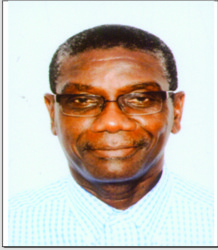Testifying before the Commission of Inquiry into the sugar industry, economist and chartered accountant Rawle Lucas says that the debt-laden Guyana Sugar Corporation should be phased out.
Appearing on Tuesday before the team of commissioners chaired by Vibert Parvatan, Lucas assessed the financial state of Guysuco and said the government should not be in the business of sugar production and should exit the industry with dignity.
Lucas, who was invited to testify, said that as an enterprise, Guysuco is doing nothing for its owners, the taxpayers of Guyana.

“In a four-year span, Guysuco took out from the economy twice as much as it had put in over the period 2009 to 2010. By comparison, Republic Bank, which is the largest private company in the (Lucas Stock Index) when measured by both total assets and market capitalization, had G$85 billion in assets in 2009 and contributed G$4.4 billion to the economy. By 2013, Republic Bank had grown both its assets and its contribution to the Guyana economy. It was contributing twice as much as Guysuco to the economy with an asset base that was just as large as that of Guysuco’s. By that time, GuySuCo had taken as much as G$25 billion from the economy..”, he asserted.
Lucas, who is a columnist in the Sunday Stabroek, said there seemed to have been an attitude at Guysuco and by those who controlled it that it was okay to waste taxpayers’ money keeping the corporation functioning as it did, even though it contributed nothing to the economy.
“There is the view that GuySuCo should not be touched because it employs massive amounts of people. Equally true is the reality that these workers, while producing physical units of cane and sugar, contribute negative value-added in monetary terms. .. I also believed the workers recognized that their work was futile and therefore were often reluctant to go to work. Management could not see how its leadership was demoralizing the workers.
“…We know that when marginal revenue equals average unit cost, the company breaks even. We also know that when marginal revenue is less than unit variable cost, the rational decision is to shut down the company. Guysuco’s gross profit data from 2011 to 2013 shows that the rational decision is to discontinue the company. Consequently, if Guysuco is to survive, it must be able to bring at least its marginal revenue in line with its average unit cost of operations. This means reducing its direct costs substantially. But even if it did that, it would also have to reduce significant amounts of its indirect costs too that stems from an inefficient bureaucracy”, Lucas stated.
He said that the evidence he has suggests that the corporation’s working capital plummeted 90 percent from $6 billion in 2008 to $564 million in 2010. Further, he said that management continued to lose control of operations as it seemed unable to control the bleeding of its working capital, losing an annual average of $9 billion from 2010 to the end of 2013.
“This inability to convert current assets into liquid cash fast enough raises questions of how GuySuCo is financing its operations. Further, the use of the Strategic Financing Model helped me to see that the largest component of GuySuCo’s financing comes from the internal equity of the company. A breakdown of that source of financing shows that the money that GuySuCo use to finance its operations come from the workers and unpaid taxes to the government. These sources of finance actually represent debts which must still be paid. A fourth source is the money set aside to replace productive assets. By spending money meant to replace long-term assets on short-term needs means that GuySuCo does not have the capacity either to recover or survive on its own. To get sufficient money on its own to run the business, the only choice available to GuySuCo is to sell off its assets”, Lucas asserted.
He added that it is this financial impotence that increases the difficulty of the company to make improvements in its field operations that leads him to conclude that GuySuCo should be phased out.
“It is a tough (decision) but one that has to be made in the interest of all Guyanese. Government should not be in the business of sugar production and it should exit the industry with dignity. In doing so, it must have a plan to aid affected workers during the transition”, he stated.
In an earlier hearing, veteran businessman Yesu Persaud said that finding a buyer for Guysuco is the most viable option for government.
“In my opinion, if we can find a buyer who’s willing to take on those debts… because you have substantial assets—the land and factories etc—take it over at a price, of course, that has to be negotiated, then I think there could be a future,” Persaud said after a meeting with the members of the Commission of Inquiry.
“I told them it is either two things: you either revise what you have, it is going to be more costly because you have to go and borrow, borrowing is a very expensive; or, one of the things you could look at, find a buyer and that may be possible,” he added.
A preliminary report will be completed by the COI within the next month while the final report will be submitted by the end of the 90 days that the commission was given to complete its work. The COI met for the first time on July 1st, 2015.





